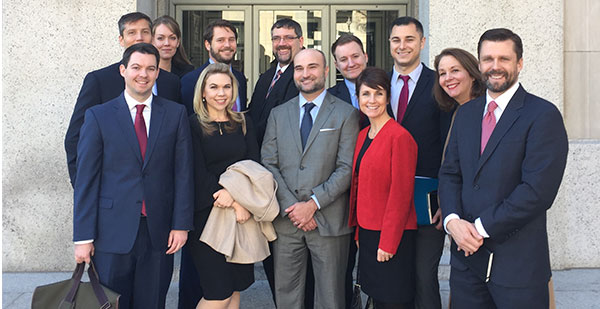
by Georgia Center for Opportunity | Feb 13, 2018
On Monday, lawmakers in the Georgia House Ways and Means Committee overwhelmingly passed House Bill 482, a measure that would make Education Savings Accounts (ESAs) a reality in the Peach State. Representatives Paul Battles (R- Cartersville), Allen Peake (R- Macon), Chuck Martin (R- Alpharetta), Trey Kelley (R- Cedartown), Dale Rutledge (R- McDonough), David Knight (R- Griffin), Sam Teasley (R- Marietta), Jay Powell (R-Camilla), Shaw Blackmon (R- Bonaire), and Brett Harrell (R- Snellville) all deserve thanks for their role in the bill’s approval.
As HB 482 advances through the legislature, it seems possible that Georgia could become the seventh state to pass ESAs
The idea is simple. Georgia taxpayers currently pay more than $10,000 per student per year for public school education. Parents who withdraw their child from public schools and opt for an ESA would be given a percentage of that money to spend on their child’s education. That money can cover private school tuition, private tutoring, educational therapy, textbooks, online classes, or other educational expenses. Money that’s left over upon high school graduation can be used for college expenses. This empowers parents – who know and love their kids more than any bureaucrat or government official – to take a more active role in their child’s education.
Thanks to an ESA program in Florida, Faith Kleffel, a student with Down Syndrome, was able to access the physical and occupational therapy she needed to thrive. Arizona’s program allows students with autism to attend a school specifically designed with their needs in mind. ESA programs in other states have allowed students to succeed when traditional schools weren’t able to supply what they needed.
Education Savings Accounts give parents more freedom to find the best education for their kids. Launching an ESA program in Georgia will be a win for Georgia kids and Georgia families.

by Georgia Center for Opportunity | Feb 6, 2018
Georgia lawmakers are poised to consider several bills that would make education savings accounts (ESAs) a reality for students in our state. ESAs empower families with the option of leaving their local public school and choosing an educational option that better fits the needs of their child—such as private school, tutoring, or online learning programs.
In a recent piece in the Atlanta Journal-Constitution, columnist Kyle Wingfield makes the strong point that at least one of these bills—House Bill 482—is “probably the most bulletproof piece of school-choice legislation Georgia has ever seen.”
Specifically, the current version of HB 482 has several provisions and accountability measures that directly address common objections raised by opponents of school choice. The bill:
- Reaches students who need help the most: It prioritizes students who have special needs, have been bullied, are from low-income households, are adopted or in the foster-care system, or live with an active-duty military parent stationed in Georgia. This hyper-targeted segment accounts for less than 0.25 percent of the entire public-school student population.
- Implements financial controls and requires standardized testing: The bill also creates strong financial accountability mechanisms for both public and private schools involved with ESAs. Another accountable measure requires students participating in the ESA program to take nationally norm-referenced tests measuring academic achievement in math and language arts.
As Wingfield summarizes, the bill “addresses every objection school-choice opponents have ever raised. Well, except for their objection to the very existence of school choice at all.”
Think about the opportunities opened up by ESAs for students who face a dim future in a school that doesn’t meet their needs:
- A low-income student in a low-performing school district can receive an education that gives him or her the best chance of flourishing in the future.
- A bullied student can escape a toxic, dangerous environment and flourish at a safer school of choice.
- A special-needs student—maybe a child with autism, a traumatic brain injury, or an orthopedic impairment—can receive the individualized attention needed to thrive.
Without ESAs and other school-choice measures, these students are likely to remain stuck in local school districts that fall short in adequately addressing their unique needs.
If lawmakers approved an ESA bill this year, Georgia would become the sixth state nationally to create one of these programs.

by Georgia Center for Opportunity | Jan 19, 2018
With much ceremony, the Georgia General Assembly kicked off the 2018 legislative session last week. Thanks to election-year buzz, candidates have fueled talk of big education reforms that could see needed movement. Because this session is expected to fly by, we have our eye on a couple of key school choice bills that could shuffle through the process quickly.
Here are two important pieces of legislation that we hope will (finally) get the traction they deserve in the State House and Senate.
Tax Credit Scholarship Expansion
No child should be denied the opportunity to seek out the education they need because of an arbitrary government roadblock, but that’s exactly what’s happening to thousands of Georgia students.
The state currently offers limited access to a popular tax credit scholarship, allowing only a small number of families an opportunity to seek out the right education for their children. However, a low cap on donated funds has meant that generous contributors- and students the program is supposed to serve- have been turned away by the state because of over-demand.
Lawmakers are said to be considering raising the program’s $58 million ceiling, which would lift barriers for many more Georgia children. Because the kids waiting in line for scholarships can’t afford another year in the wrong classroom, we’re urging the legislature to waste no time in passing an expansion of the tax credit scholarship bill.
Education Savings Accounts
Education Savings Accounts (ESAs) aim to provide needed flexibility and customized education options for Georgia parents. Similar to Flexible Spending Accounts (FSAs) or Health Savings Accounts (HSAs), under an ESA, the state would put money into a restricted account for education expenses that parents would control.
While there are several versions of the legislation that seek to fit the needs of different families-such as those in the military or those with children who have disabilities- the passage of nearly any of these bills would make a big impact in the lives of many Georgia parents.
The Georgia Center for Opportunity is committed to removing barriers for our state’s kids so that they receive the education they need. While the legislature will have their hands full, we hope they agree that bills benefitting children and their families should stand out among their highest priorities. To follow the progress of these bills with us, check back on our blog or subscribe to the GCO’s newsletter.

by Eric Cochling | Dec 12, 2017
In the post below, Executive Vice President Eric Cochling talks about a recent visit with leaders in Washington D.C. and how GCO’s work is being noticed on Capitol Hill.
I have to admit that last week was a tiring whirlwind of activity, but it turned out to be a wonderful opportunity to inform and influence federal policy.
I spent most of last week in Washington, DC taking part in meetings with the Department of Labor, the Office of Management and Budget, the Federal Trade Commission, various House and Senate offices, and the domestic policy staff of the White House.
Each meeting was focused on the need to get more American’s back to work and the way state organizations, like GCO, are working to make that goal a reality. Of particular interest was what the federal government can and should do to help states remove barriers to employment.
I was able to present to the leaders in the various offices on the research and community-based work that GCO is doing to address joblessness.
The topics we discussed included:
- How states, with the federal governments encouragement, can expand apprenticeship opportunities for high school students who are not college-bound and need a pipeline into work,
- Welfare reforms that will move people to self-sufficiency, including simplifying the system, requiring and incentivizing work across all programs, and removing disincentives to family formation,
- Ways to remove systemic barriers to employment found in state laws, including those that needlessly restrict vocational licensing and access to driver’s licenses,
- Local initiatives, like GCO’s Hiring Well, Doing Good, that are designed to help reinvigorate the local, community-based response to helping people find work.
While politics are more polarized than I’ve witnessed in my lifetime, I was heartened by what appeared to be genuine interest in practical ways to help reinvigorate local, civil society answers to unemployment.
I was also encouraged by a consistent message that the federal government is looking to states to solve problems like this and are actively working – via welfare reform and other policy changes – to give back to the states the authority to tackle these problems effectively.
It is time for state leaders to prepare themselves to take on these tough issues and GCO stands ready to help.

by Georgia Center for Opportunity | Nov 22, 2017
As lawmakers prepare to head back to the Capitol in January, Georgians have now received a glimpse of some issues that might move the needle in the 2018 election cycle. A new study released by the Georgia College Department of Government and Sociology finds that parents are increasingly looking toward school choice options as approval for public schools is suffering.
When asked about their level of satisfaction with public education, only 9.9 percent of respondents said they were strongly satisfied with public schools. However, a staggering 30.3 percent of respondents said they were “very dissatisfied” with their kids’ school.
However, parents seem to see a clear alternative. According to the report, 59.8 percent of respondents expressed support for charter schools.
The Georgia State survey is another clear indication that Georgians want more educational options for parents. In January, the Atlanta Journal-Constitution released a poll finding that 61 percent of voters supported school choice legislation. In May of 2016, a whopping 75 percent of GOP primary voters said they believed the state should empower parents through school choice.
Elected officials will be faced with significant legislation in the 2018 session that could enable greater access to quality public education. Bills that would create Education Savings Accounts (ESAs) and expand the popular Tax Credit Scholarship program will be up for consideration.
You can view the full report here.

by Georgia Center for Opportunity | Nov 17, 2017
The Christmas season is often marked by joy, but for many children with incarcerated parents, the holidays can be a painful reminder of their mom or dad’s absence.
The Georgia Center for Opportunity is committed to building healthy family relationships and enabling inmates to reenter their communities with the greatest chance of success. That’s why the Angel Tree program is a close partner of our organization, and it’s why we’re encouraging you to consider participating this holiday season.
The Angel Tree program offers incarcerated parents an opportunity to provide a Christmas gift and a personal message to their child. Gifts are purchased by generous individuals, and delivered by local volunteers on behalf of the parents as a tangible expression of love.
Many children in Georgia are in need of this caring service. If you or your organization would like to participate, you can register for the program or donate through the Prison Fellowship.





